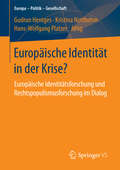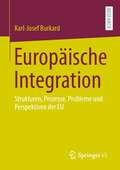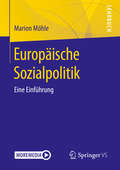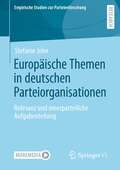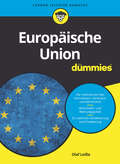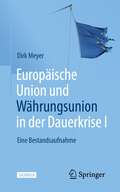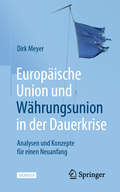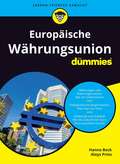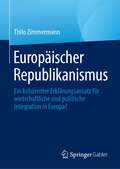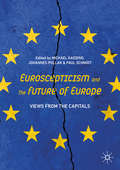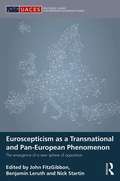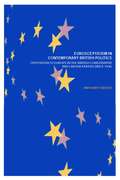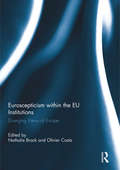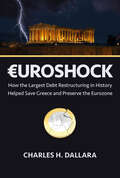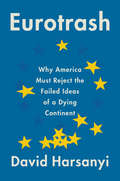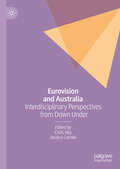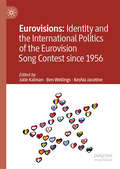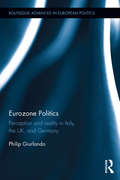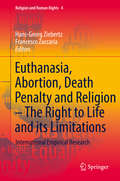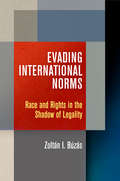- Table View
- List View
Europäische Identität in der Krise?
by Gudrun Hentges Kristina Nottbohm Hans-Wolfgang PlatzerAus einer deutsch-französischen Perspektive setzen sich die Beiträge dieses Bandes mit dieser politisch wie wissenschaftlich gleichermaßen vielschichtigen und brisanten Thematik auseinander. Dabei werden zwei Forschungsstränge zusammengeführt, die bislang ein eher getrenntes Dasein führten: die europawissenschaftliche Forschung über europäische Identität und europäisierte Öffentlichkeiten und die Rechtspopulismus- und Rechtsextremismusforschung.
Europäische Integration: Strukturen, Prozesse, Probleme und Perspektiven der EU
by Karl-Josef BurkardAusgehend von den Motiven und Interessen am Beginn des europäischen Integrationsprozesses nimmt der Autor eine historisch-systematische Bestandsaufnahme der EU als einer einzigartigen Vertrags- und Rechtsgemeinschaft vor: Dazu analysiert er den Prozess der ökonomischen Integration, die komplexen politischen Entscheidungsprozesse im europäischen Mehrebenensystem, den Weg von der Gründung zur Erweiterung und Vertiefung, die aus den ungelösten politischen und ökonomischen Strukturproblemen resultierenden Gefährdungen des Zusammenhalts sowie die Diskussion über die Zukunft der Union.
Europäische Sozialpolitik: Eine Einführung
by Marion MöhleDieses Lehrbuch vermittelt übersichtlich die Grundlagen der europäischen Sozialpolitik und ihren Kontext. Es wird dargestellt, wie und warum die Europäische Union überhaupt sozialpolitisch agiert – obwohl die Sozialpolitik hauptsächlich Angelegenheit der Mitgliedsstaaten ist. Dabei werden die einzelnen Handlungsfelder wie z.B. die Beschäftigungspolitik, die Gesundheitspolitik sowie die Politik gegen soziale Ausgrenzung und Armut systematisch dargestellt. Die Entwicklung von den Anfängen sozialpolitischen Handelns der Europäischen Union werden ebenso erläutert wie die Akteure und die Instrumente europäischer Sozialpolitik. Abgerundet wird das Buch mit einem Ausblick auf die Zukunft eines sozialen Europas.Zusätzliche Fragen per App: Laden Sie die Springer Nature Flashcards-App kostenlos herunter und nutzen Sie exklusives Zusatzmaterial, um Ihr Wissen zu prüfen.
Europäische Themen in deutschen Parteiorganisationen: Relevanz und innerparteiliche Aufgabenteilung (Empirische Studien zur Parteienforschung)
by Stefanie JohnStefanie John untersucht, in welcher Weise sich die Vielfalt europäischer politischer Angelegenheiten in der Politikartikulation von ausgewählten deutschen Parteien niederschlägt und ob innerhalb der Parteien eine Art Aufgabenteilung existiert, wonach zentrale innerparteiliche Akteure unterschiedliche europäische Themen zum Gegenstand ihrer Politikartikulation machen. Konkret wird hier die Politikartikulation von Parteitag, Parteiführung und Fraktion theoretisch reflektiert und empirisch untersucht. Die empirische Untersuchung beruht auf einer umfänglichen Analyse politischer Dokumente und deckt einen Analysezeitraum von zehn Jahren ab. Es kommen unter anderem neu entwickelte Indizes zum Einsatz, um Muster einer innerparteilichen Aufteilung von politischen Themen aufzudecken. Es zeigt sich, dass sich in der Politikartikulation der drei Parteiakteure die europäische Themenvielfalt widerspiegelt, die von Polity-Fragen bis zu Policy-Themen in zahlreichen Politikfeldern reicht. Aufgedeckte Muster belegen die Existenz einer innerparteilichen Aufgabenteilung in der Politikartikulation. Diese Muster zeigen sich in weiten Teilen unabhängig vom Parteiorganisationsverständnis der Parteien.
Europäische Union für Dummies (Für Dummies)
by Olaf LeißeDie Europäische Union beeinflusst das Leben aller Menschen - ob es Studierende der Politischen Wissenschaften sind, die dieses Pflichtmodul bestehen müssen, oder der Normalbürger, der sich fragt, wie sich die Geldpolitik der Europäischen Zentralbank wohl auf seine Ersparnisse auswirkt. Studierenden oder Sparern gemein ist das Staunen über die Vielfalt der europäischen Organisationen und deren Möglichkeit zur Gestaltung von Politik. Olaf Leiße schafft Klarheit. Leicht verständlich erläutert er die Aufgaben und Funktionen der großen Organisationen wie Europäischem Rat, Europäischer Kommission, Europäischem Parlament und Europäischem Gerichtshof und zeigt, wie sie die Wirtschafts- und Währungspolitik, die Wettbewerbs- und Förderpolitik, die Außen- und Sicherheitspolitik, die Landwirtschafts- und Umweltpolitik und die Bildungspolitik für die 500 Millionen Menschen der 28 Länder gestalten, die Mitglieder der Europäischen Union sind. Nach der Lektüre dieses Buches werden Ihnen viele Entscheidungen in dieser großen Gemeinschaft klarer.
Europäische Union und Währungsunion in der Dauerkrise I: Eine Bestandsaufnahme
by Dirk MeyerDie europäischen Integrationsanstrengungen stehen auf der Kippe. Dabei wirkt die Euro-Währungsunion in ihrer jetzigen Verfassung ungewollt eher als ein Des-Integrationsfaktor denn als ein verbindendes Element. Dirk Meyer liefert Zustandsbeschreibungen, Analysen und Hintergründe dieser Krise. Das Buch ist das Ergebnis einer über zehnjährigen Beschäftigung mit der Thematik.
Europäische Union und Währungsunion in der Dauerkrise: Analysen und Konzepte für einen Neuanfang
by Dirk MeyerDie europäischen Integrationsanstrengungen stehen auf der Kippe. Dabei wirkt die Euro-Währungsunion in ihrer jetzigen Verfassung ungewollt eher als ein Des-Integrationsfaktor denn als ein verbindendes Element. Dirk Meyer liefert Zustandsbeschreibungen, Analysen, Hintergründe und Zusammenhänge, die in der Tagespolitik entweder gar nicht zum Tragen kamen oder aber schnell vergessen wurden. Konzepte einer möglichen Umstrukturierung der Währung hin zu einer funktionsfähigen Gemeinschaftswährung bilden einen konstruktiv-zuversichtlich stimmenden Ausblick. Das Buch ist das Ergebnis einer etwa zehnjährigen Beschäftigung mit der Thematik.
Europäische Währungsunion für Dummies (Für Dummies)
by Hanno Beck Aloys PrinzEuro-Krise, EZB, Währungsunion, Rettungsschirm. Begriffe wie diese begegnen Ihnen täglich in den Medien. Doch was bedeuten sie konkret? Wie funktioniert eine Währungsunion und welche Probleme bringt sie mit sich? Wie kam es zur Euro-Krise? Wie hat die Politik reagiert? Welche Wege gibt es dort hinaus und wie sollen sie funktionieren? Hanno Beck und Aloys Prinz erklären den Euro und die Euro-Krise fundiert und wunderbar verständlich. So können Sie sich in Zukunft selbst ein Bild von der Lage und der Zukunft der Euro-Zone machen und Rettungspakete, Schuldenbremse, Vergemeinschaftung von Schulden und andere Politiken besser bewerten.
Europäischer Republikanismus: Ein kohärenter Erklärungsansatz für wirtschaftliche und politische Integration in Europa?
by Thilo ZimmermannIn diesem Buch werden die aktuellen Theorien der europäischen Integration, wie Föderalismus, Neofunktionalismus und liberaler Intergouvernementalismus, mit ihren Stärken und Schwächen vorgestellt. Es wird dann argumentiert, dass die Kombination der republikanischen Theorie mit der Theorie des öffentlichen Gutes, der res publica der öffentlichen Güter, die europäische Integration besser erklären könnte. Die Theorie der öffentlichen Güter muss jedoch übernommen werden, um sie auf den europäischen Republikanismus anwendbar zu machen. Schließlich zeigt das Buch, wie dieser neue Rahmen weitere akademische Debatten beeinflussen kann, z. B. über Souveränität und Währungsintegration, externe Effekte eines gemeinsamen europäischen Marktes und die treibende Kraft der europäischen Integration. Da der republikanische Ansatz nicht einer rein wirtschaftlichen Logik folgt, bleibt Raum für politische Überlegungen und Motivationen. In diesem aktuellen und interdisziplinären Buch verbindet der Autor viele wichtige Stränge der europäischen Integrationstheorie, der Geschichte, der Ökonomie und der Politikwissenschaften, die klar zu einem kohärenten analytischen Diskurs zusammengeführt werden. Seine Stärke liegt in der interdisziplinären Interaktion zwischen Politik und Wirtschaft sowie in theoretischen und praktischen Fragen, die für die öffentliche Debatte in Europa von hoher Relevanz sind. Dieses Buch wird für Wissenschaftler und Studenten von Interesse sein, die sich für wirtschaftliche Integration sowie für Geschichte und politische Philosophie interessieren.
Europäisches Immaterialgüterrecht: Funktionen und Perspektiven (MPI Studies on Intellectual Property and Competition Law #26)
by Reto M. Hilty Thomas JaegerDas Buch folgt der Ausgangsvermutung, dass die EU nach wie vor keine kohärente Immaterialgüterrechtspolitik verfolgt, sondern über punktuelle, meist anlassbezogene Maßnahmen agiert. Die Schutzrechte erfüllen die ihnen zugedachten Funktionen damit oft nicht. Vor allem entfalten sie nicht ihr volles Potenzial für den Binnenmarkt.Untersucht wird, inwieweit die Regelungen der einzelnen Schutzrechte in sich selbst, im Verhältnis zu einander sowie zum sie umgebenden Wettbewerbsrecht, aber auch zum nationalen Recht funktionsadäquat sind.Dieser breit angelegte Gesamtblick auf den Acquis Communautaire erlaubt es aufzuzeigen, wo Handlungsbedarf besteht, wie alternative Regelungen aussehen könnten und welche Mechanismen dafür zur Verfügung stehen.
Eurosceptic Contagion: The Influence of Eurosceptic Parties in West-European Party Systems (Springer Series in Electoral Politics)
by Alexandru FilipIn light of the growing support for populist political actors, this book examines political party behavior and political positions towards the integration process in the European Union. It explores the correlation between eurosceptic success and mainstream party behavior.Presenting both an indepth empirical investigation of electoral campaigns and the politics of party leaders, as well as applying various theoretical models, the author analyses different eurosceptical trends and circumstances and dynamics of eurosceptic contagion. In particular, he addresses the following questions: Do Europe's mainstream parties maintain their standard discourse and policy positions unaltered, or are they forced to qualify their typical pro-integration stances when eurosceptic challengers are successful at the ballot box? Are some parties or party systems more susceptible to eurosceptic “contagion” than others? These are just some of the timely questions that are examined by the author.The book argues that political parties at the ideological center of their party systems use the electoral success of eurosceptic parties as indications of changes in the public’s political preferences. In order to avoid losing voters to these parties, moderate parties will qualify their positions on the issue of EU integration. The author explores these dynamics and discusses their implications for the future of European integration.
Euroscepticism and the Future of Europe: Views from the Capitals
by Michael Kaeding Paul Schmidt Johannes Pollak"The European Parliament elections in May 2019 did not bring about the rise of populism in Europe that had been feared by many. Instead, while populism was contained, a broad pro-European majority emerged that today carries the new European Commission with its ambitious green, digital and geopolitical agenda. However, Euroscepticism remains a significant force to be reckoned with in national and EU-policy making. The present book offers a better understanding of the different types of Euroscepticism that exist across Europe. It also shows that Euroscepticism is best addressed by understanding well the often valid concerns that are at the origins of Eurosceptic forces. If this is done in time, Euroscepticism is not something to be afraid of. It is part of a vibrant European democracy that is resilient enough to embrace those who criticise the reality of the European project with good arguments; and that stands ready to develop and improve day by day to become a more perfect Union.” - Martin Selmayr, Head of the European Commission’s representation in Austria"This book comes at the right time. European integration seems more contested than ever, but is it really? This book answers this question by probing into 40 shades of Euroscepticism, within and beyond the EU Member States. It is a must read for academics and practitioners alike."- Christine Neuhold, University of Maastricht, The Netherlands"With this book, the authors offer readers of European politics a treasure trove, with valuable insights into the variety of populist and nationalist forces that oppose mainstream European integration. Faced with such a jumble of eurosceptic parties pursuing narrow and in many cases reactionary agendas, the need for proper federal political parties becomes self-evident. Only then will the diverse interests and aspirations of citizens be given realistic expression at the EU level."- Andrew Duff, President, The Spinelli GroupThis book sheds light on how the increasing prominence of Eurosceptic and nationalist parties is having an impact on the thinking of mainstream parties, their representatives in the European Parliament, and the future of Europe. It is timed to coincide with the strategic vision of Council, Commission, and Parliament, as well as the next phase of Brexit negotiations. The book provides perspectives on the future of the European project from authors in all the EU Member States, as well as neighboring European countries and potential applicant nations. Furthermore, it includes a Foreword by the Vice-president of the European Parliament.With many Eurosceptic parties now in national government, or winning European elections and thus exerting influence over the national debate, this book maps and analyses the nature and impact of Euroscepticism—and new nationalist tendencies—in the different party systems of Europe.As national political parties are the gatekeepers of the process of political representation, they play a pivotal role in mobilizing civil society and in setting the political agenda. They shape politics at a national level, but also determine the way in which Europe plays out—or does not play out—as a political issue. Thus, it is from the national capitals that the very future of Europe emerges.
Euroscepticism as a Transnational and Pan-European Phenomenon: The Emergence of a New Sphere of Opposition (Routledge/UACES Contemporary European Studies)
by Benjamin Leruth John FitzGibbon Nick StartinAs the EU enters an increasingly uncertain phase after the 2016 Brexit referendum, Euroscepticism continues to become an increasingly embedded phenomenon within party systems, non-party groups and within the media. Yet, academic literature has paid little attention to the emergence of, and increased development of, transnational and pan-European networks of EU opposition. As the ‘gap’ between Europe’s mainstream political elites and an increasingly sceptical public has widened, pan-European spheres of opposition towards the EU have developed and evolved. The volume sets out to explain how such an innately contradictory phenomenon as transnational Euroscepticism has emerged. It draws on a variety of perspectives and case studies in a number of spheres – the European Parliament, political parties, the media, civil society and public opinion. Examining to what extent the pan-European dimension of Euroscepticism is becoming increasingly influential, it argues that opposition to European integration has for too long been viewed somewhat narrowly, through the paradigm of national party politics.This text will be of key interest to scholars, students and professionals in EU politics, European studies, political parties, and more broadly to comparative politics and international relations.
Euroscepticism in Contemporary British Politics: Opposition to Europe in the Conservative and Labour Parties since 1945
by Anthony ForsterAnthony Forster argues that euroscepticism, in addition to being a political stance, displays the seeds of becoming a new faith. Through a detailed analysis of British post-war politics, he shows the development of a core set of beliefs, a history of persecution, displays of moral rectitude in opposing Europe and the power of scepticism to change existing beliefs.This challenging new history of euroscepticism will be a valuable resource for undergraduate students of politics and European studies.
Euroscepticism within the EU Institutions: Diverging Views of Europe (Journal of European Integration Special Issues)
by Olivier Costa Nathalie BrackSince its origins, there have been competing views concerning the nature, scope and objectives of the process of integration and of the European Union. Attitudes towards Europe and European integration, both among political elites and citizens, have been much studied over the last 15 years. But there is no comprehensive analysis of these competing views of Europe at the supranational level. The existence of radically diverging views on the European political system within the EU’s own institutions is problematic at both theoretical and practical levels. Little is known, however, about this phenomenon, its impact on the EU’s agenda and policy-making as well as on constitutional reform. This book aims therefore at investigating the divergence in views about the European Union in order to lend insight into its consequences for the functioning of the EU and its institutions. It will focus on the main EU institutions, i.e. the Council, Commission, Parliament and Court but will also deal with the visions of various European elites on the EU. This book was originally published as a special issue of Journal of European Integration.
Euroshock: How the Largest Debt Restructuring in History Helped Save Greece and Preserve the Eurozone
by Charles H. DallaraThe inside story of the unprecedented restructuring of Greece’s debt in 2012—the largest restructuring in history—and how the Eurozone was stabilized and Greece was saved from exit from the Euro and economic calamity. In the fall of 2009, the world economy was beginning to recover from the global financial crisis that had shaken global markets and had led to a sharp recession. At the same time, Europe was entering a new phase of economic stress. By the spring of 2011, the European economy had exploded into a full-blown crisis with Greece at the center. The euro, a currency just over a decade old, was under severe pressure and there was growing speculation about Greece leaving the Eurozone and thereby fracturing the common currency, leading potentially to an unraveling of the euro. Against this backdrop, urgent negotiations were launched to pull Greece and Europe back from the brink of disaster. This is the inside story of those negotiations.
Eurotrash: Why America Must Reject the Failed Ideas of a Dying Continent
by David HarsanyiNational Review senior writer David Harsanyi explains why Europe is coming apart at the seams and we should not adopt their ideas to address America’s problems.Europe has been declining under the weight of its antiquated institutions, economic fatigue, moral anemia and cultural surrender. Yet American politicians, technocrats, academics, and pundits argue, with increasing popularity, that Americans should look across the Atlantic for solutions to the nation’s problems, including on issues like health care, the welfare state, immigration, and a bloated bureaucracy.David Harsanyi argues we are looking in the wrong place. By every economic and societal measure, the United States is more tolerant than Europe. It is more welcoming of immigrants, but also far more successful at assimilating them. Minorities do far better in United States. Our economy is dominant. Only one European company appears in top 10 corporate powerhouses in the world and only seven in the top 50. Americans make up nearly half of the list. Americans are far more charitable and happier than Europeans. Our slightly lower life expectancy and our slightly higher infant mortality rate are not a result of substandard care, but a statistical misunderstanding based on the fact we treat every life as one worth saving. In this biting, fast-moving, and well-researched polemic, Harsanyi debunks prevailing notions about European supremacy and makes an unapologetic case for American exceptionalism, offering insight and reasoned arguments to counter current policy prescriptions.
Eurovision and Australia: Interdisciplinary Perspectives from Down Under
by Chris Hay Jessica CarnielThis book investigates Australia’s relationship with the Eurovision Song Contest over time and place, from its first screening on SBS in 1983 to Australia's inaugural national selection in 2019. Beginning with an overview of Australia’s Eurovision history, the contributions explore the contest’s role in Australian political participation and international relations; its significance for Australia’s diverse communities, including migrants and the LGBTQIA+ community; racialised and gendered representations of Australianness; changing ideas of liveness in watching the event; and a reflection on teaching Australia’s first undergraduate course dedicated to the Eurovision Song Contest. The collection brings together a group of scholar-fans from a variety of interdisciplinary perspectives — including history, politics, cultural studies, performance studies, and musicology — to explore Australia’s transition from observer to participant in the first thirty-six years of its love affair with the Eurovision Song Contest.
Eurovisions: Identity and the International Politics of the Eurovision Song Contest since 1956
by Julie Kalman Ben Wellings Keshia JacotineThis book uses the Eurovision Song Contest (ESC), as an analytical entry point to understand and illuminate post-War Europe and the drive to create an identity that can legitimise the European project in its broadest sense. The ESC presents an idealised vision of Europe, and this has long existed in a strained relationship with reality. While the trajectory of post-war European integration is a high-profile topic, we believe that the ESC offers a unique and innovative way to think about the role of culture in the history of post-War European integration and tensions between the ideal and reality of European unity. Through the series of case studies that make up the chapters in this book, analysis brings these interlinked tensions to light, exploring the roles of culture and identity, alongside and a productive conversation with the political and economic projects of post-war European integration.
Eurozone Politics: Perception and reality in Italy, the UK, and Germany (Routledge Advances in European Politics)
by Philip GiurlandoThe crisis of the Eurozone has had a significant impact on the politics of Europe. In many countries, the euro was largely interpreted by elites as a development that would ameliorate their nations’ problems. However, recent events have proven the contrary, with the rise of radical right-wing politics and populism across the continent. This book investigates the politics of the euro, with a primary focus on Italy, but also with additional chapters on the UK and Germany. Using a range of original and secondary data, it reconstructs how the euro was interpreted by both elites and non-elites from the late nineties to 2010. By recruiting a large sample of non-elites, it examines perceptions of the euro and the ways in which these views allowed for the justification of painful austerity measures required to enter the Economic and Monetary Union. In doing so, it sheds light on the ways in which non-elites interpret complex political objects like the euro and provides a systemic comparison of the cognitive schema of non-elites and elites. This book will be of key interest to scholars and students of the European Union, European politics, Italian politics, comparative politics and political economy.
Euthanasia, Abortion, Death Penalty and Religion - The Right to Life and its Limitations: International Empirical Research (Religion and Human Rights #4)
by Hans-Georg Ziebertz Francesco ZaccariaThis book considers how the termination of life might be accepted in the view of a general obligation to protect life. It features more than 10 papers written by scholars from 14 countries that offer international comparative empirical research. Inside, readers will find case studies from such areas as: India, Chile, Germany, Italy, England, Palestine, Lithuania, Nigeria, and Poland. The papers focus on three limitations of the right to life: the death penalty, abortion, and euthanasia. The contributors explore how young people understand and evaluate the right to life and its limitations. The book presents unique empirical research among today's youth and reveals that, among other concepts, religiosity matters. It provides insight into the acceptance, perception, and legitimation of human rights by people from different religious and cultural backgrounds. This investigation rigorously tests for inter-individual differences regarding political and judicial rights on religious grounds, while controlling for other characteristics. It will help readers better understand the many facets of this fundamental, yet controversial, philosophical question. The volume will be of interest to students, researchers, as well as general readers searching for answers.
Eva Braun: Una vida con Hitler
by Heike B. GörtemakerLa biografía definitiva de la amante de Hitler que ofrece un retrato íntimo y paralelo de la vida del dictador nazi y del ascenso y caída del régimen que creó. Él era el Führer solitario, el hombre comprometido con una nación: Alemania. Así lo presentaba la propaganda nacionalsocialista, que no dejaba espacio posible para una relación sentimental en la vida de Hitler. Sin embargo, una mujer lo acompañó durante cerca de quince años, en las reuniones decisivas, en los peores momentos, en el Berlín asediado por los soviéticos, en la hora de su muerte. Adolf Hitler tenía una amante cuya existencia permaneció oculta hasta el final del Tercer Reich: Eva Braun. ¿Quién era la mujer con la que se casó Hitler poco antes de su caída? ¿Qué significó para ella vivir con uno de los mayores criminales de la historia? Heike B. Görtemaker ha buscado las respuestas y ha permitido a Eva Braun salir de las sombras para desvelar la intimidad de un dictador durante la época más catastrófica de la historia de Alemania. Reseñas:«Esta biografía de Frau Hitler, la más rigurosa y documentada, cambiará la idea de la rubia tonta impasible ante los asesinatos en masa.»Klaus Wiegrefe «No es posible estar más cerca de Eva Braun.»Die Welt
Eva Luna
by Isabel AllendeBorn in the back room of the mansion where her mother toils, and herself in service from an early age, the enchanting and ever-enchanted Eva Luna escapes oppression through story telling.
Evader: The Epic Story of the First British Airman to be Rescued by the Comete Escape Line in World War II
by Derek ShuffIn 1941 air gunner Sergeant Jack Newton’s Wellington is hit by flak on his first bombing raid over Germany. Miraculously, the skipper makes an emergency landing on a German-occupied Belgian airfield, narrowly avoiding Antwerp Cathedral. Having torched the plane, the crew give the unsuspecting Germans the slip and are hidden by the Resistance. Hoping to make it to the coast and back across the Channel, the airmen are surprised when the 23-year-old female leader of the Comete Escape Line, Andree de Jongh – codenamed Dedee – has other plans for them. Full of terrifying and humorous moments, this is the story of the epic journey of the first British airman to escape occupied Europe during the Second World War.
Evading International Norms: Race and Rights in the Shadow of Legality (Pennsylvania Studies in Human Rights)
by Zolt�n B�z�sHow do states violate human rights norms after legalization? Why are these violations so persistent? What are the limits of legalization for protecting human rights norms? Conventional wisdom offers a variety of answers to these questions, but most often they conflate laws and norms and focus only on state actions that violate both. While this focus is undoubtedly valuable, it does not capture cases in which states violate human rights norms without technically violating the law. Norm breakers are not necessarily lawbreakers. Focusing exclusively on norm violations that are illegal obscures the possibility that agents could violate norms in a legal manner, engaging in actions that are awful but lawful.Presenting rich case studies of the French expulsion of Roma immigrants from 2007 to 2017 and the Czech segregation of Roma children in schools for those with mild mental disabilities between 1993 and 2017, Evading International Norms argues that the violation of human rights norms often continues after legalization under the cover of technical legality. While laws and norms overlap, interact, and shape each other in many ways, they tend to reflect each other only selectively, which leads to the existence of norm-law gaps. Taking advantage of such gaps, states resist unwanted human rights obligations by transgressing international human rights norms without violating the laws designed to protect them—a process Zoltán I. Búzás names norm evasion.Based on a wealth of evidence, including more than 160 interviews, the book shows that the treatment of the Roma by France and the Czech Republic violated the norm of racial equality in a technically legal fashion. Búzás cautions that the good news about law compliance is not necessarily good news about norm compliance and draws attention to racial discrimination against the Roma, one of the largest and most marginalized European minorities.
